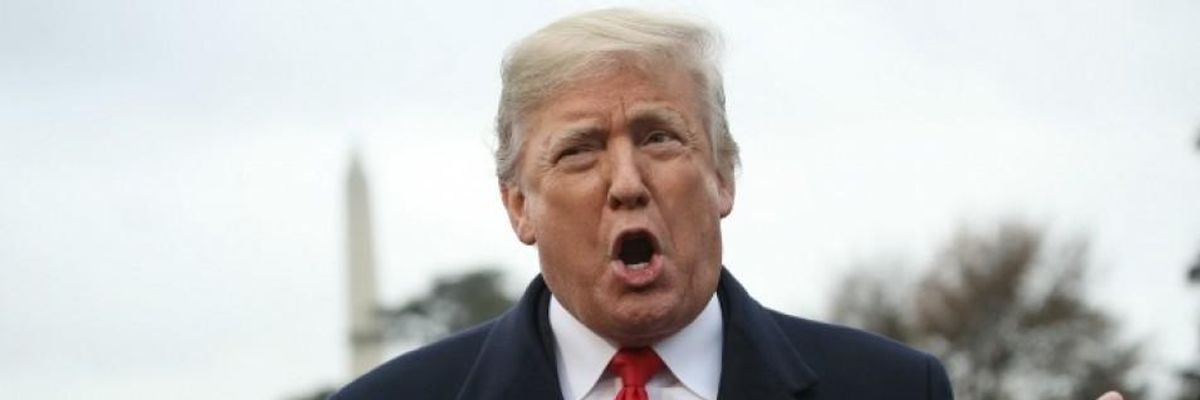Trump reversed his decision to host next June's G-7 meeting of heads of state at Trump National Doral Miami because, he said, it would have been an impeachable offense and a violation of the Constitution's Emoluments Clause.
No, that's not the reason he gave. He said he reversed himself because of "Media & Democrat Crazed and Irrational hostility."
In reality, Trump has been funneling government dollars into his own pockets ever since he was elected. The Doral deal was just too much even for his Republican enablers to stomach.
Since he's been president, Trump has spent almost a third of his time at one or another of his resorts or commercial properties--costing taxpayers a bundle but giving those resorts incomparable publicity.
One of his golf resorts, Turnberry in Scotland, has gotten business from U.S. Air Force crews overnighting while their planes were refueled. In September, Vice President Pence stayed there for two nights at a cost to American taxpayers of nearly $600,000 in ground transportation fees alone.
Foreign governments seeking to curry his favor routinely check their officials and lobbyists into the Trump International Hotel in Washington, D.C.
Mar-a-Lago, Trump's oceanfront resort in Palm Beach, charges its foreign government visitors up to five hundred and fifty dollars a night for their rooms, according to ProPublica.
How does he get away with this?
Presidents of the United States are exempt from the federal conflict-of-interest statutes--a glaring omission that was never a problem before Trumpexploited this loophole. To make matters worse, Trump has refused to put his assets into a blind trust, so he knows exactly how much he gains from these transactions.
Theoretically, the public is protected from Trump's moneymaking by the Constitution, which strictly limits the "emoluments"--that is, a payment of money or anything else of value--a president can receive.
Article II, Section 1 says a president receives a salary while in office but "shall not receive within that Period any other Emolument from the United States." Trump violates this clause every time taxpayer money finds its way into his pockets.
And then there's Article I, Section 9, which states that no federal officeholder can receive any "Emolument" from any foreign state. Trump violates this clause whenever he makes money from a foreign government.
History shows that the reason the Framers of the Constitution included these provisions wasn't just to prevent a president from being bribed. It was also to prevent the appearance of bribes, and thereby maintain public trust in the presidency.
The appearance if not reality of bribery continues to haunt Trump. For example, when he decided to withdraw U.S. troops from the Turkish-Syrian border--a move that has led to the slaughter of Kurds, and opened the way for a resurgence of ISIS--it was far from clear whether he had in mind the interest of the United States or his own business interests. Trump Towers in Istanbul Turkey is his largest European property.
Clearly, Trump continues to violate the Constitution's emoluments clauses. So how to hold him accountable? Three ways.
The first is through the federal courts. A lawsuit brought by the attorneys general of Maryland and the District of Columbia accuses Trump of violating the Constitution by holding a financial interest in the Washington hotel.
Another brought be several plaintiffs allege that Trump's businesses pose unfair competition.
A third lawsuit by 215 Democratic members of Congress seeks "the opportunity to cast a binding vote" on the issue, since the Constitution requires the president to obtain "the consent of Congress" before accepting any emolument.
But all these cases are moving through the courts at a slow pace--probably too slowly to stop Trump from lining his pockets this term of office.
The second way to hold Trump accountable is through impeachment, which has already begun in the House.
Trump's violation of the emoluments clause should be added to the likely grounds for impeachment already being investigated--seeking the help of a foreign power in an election, and obstruction of justice.
The third and most important way to hold Trump accountable occurs November 3, 2020.
That's when the American public can stop Trump from making money off his presidency by voting him out of office.

